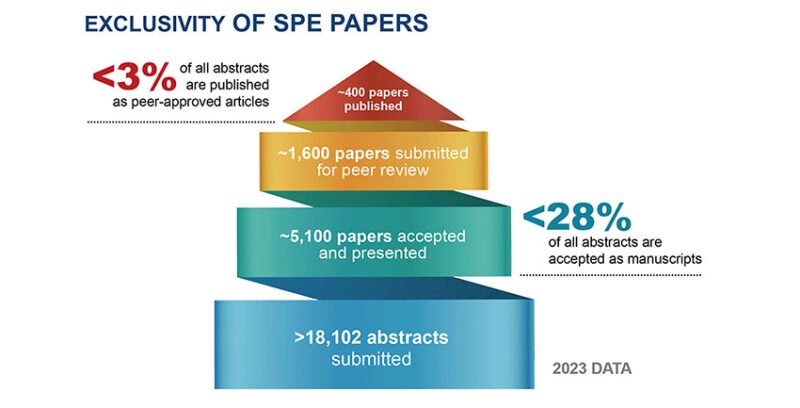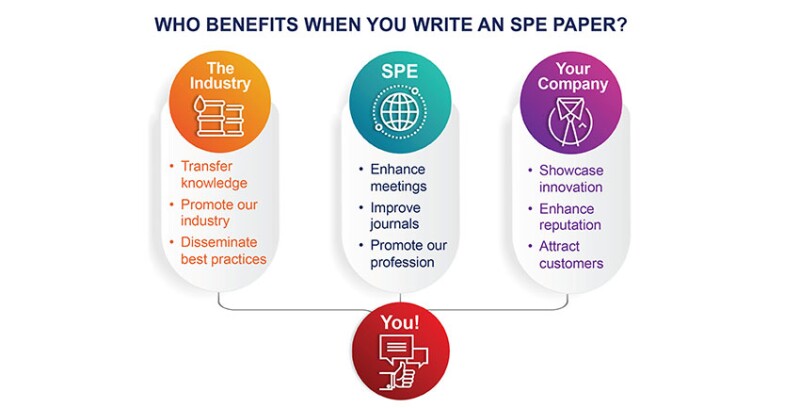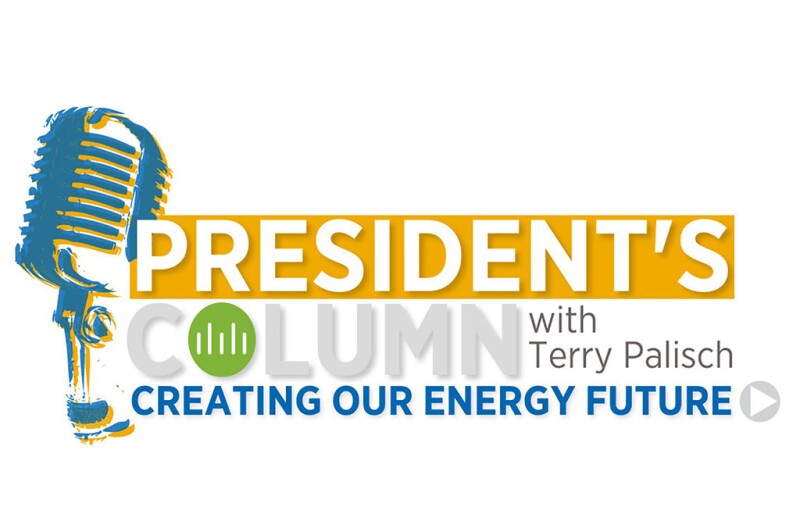This transcript is an excerpt from the podcast episode. Listen to the full episode here.
Hello, I’m Bryan Hibbard, senior editorial operations manager for SPE, I’m pleased to join 2024 President Terry Palisch as he continues his discussion about the ways we connect our members to technology by focusing on SPE papers, JPT, and other SPE publications. Terry, thank you for inviting me.
Thank you for joining me, Bryan. I appreciate you taking the time to be the host. I thought you would make a good host for this topic.
In December, I talked about regional sections and how I think that they are the face of SPE, and similarly when I think of reading and writing SPE papers or reading the Journal of Petroleum Technology (JPT), and the SPE Journal, these too are some of the key aspects of being an SPE member. It’s also front and center to our mission statement connecting our members to technology, serving as one of the primary ways we do that, and it also plays a role in connecting our members to other members.
So, I thought it would be important to spend this episode talking about the importance of SPE papers, JPT, and continuing our focus on how members can get the most out of their SPE membership and in turn create their energy future.
SPE papers mean a lot to me. I manage the journals, as well as the conference papers at SPE. I know they are very special to you as well. When you and I did the How to Write a Good Abstract webinar together a couple of months ago, we got to hear a lot about your opinions on how to write a great abstract. So why do you think SPE papers are so important?
Let me just tell you a quick story to illustrate the importance of papers. When I was a member of the Dallas Section several years ago, Danny Bell (SPE Dallas Section Education Chair) said his committee thought that writing papers was very important, so they asked me to put on a seminar on how to write SPE papers. That is what led to the webinar that you were just talking about.
If you think about technical papers, engineers in all industries write technical papers, they do it to disseminate information and to memorialize their ideas and their discoveries. It is important to any profession that we write and document.
When it comes to SPE I think papers are critical; without them we don’t have conferences or symposia. They enrich the multisociety library, OnePetro. In the end, it’s the way we disseminate technology and information to our members. But it’s also important to authors because they do the heavy lifting, they are the ones who do the writing, and sometimes they do it in their off time. More information about this is available from our webinar, mentioned earlier.
If you write a paper, you get exposure. My 50‑plus papers have been downloaded over 50,000 times. They have longevity because the paper is made available in OnePetro and stays there forever. One of my oldest papers, I wrote in 1994, is still being downloaded periodically. I can also see that some of my papers have been cited over 100 times.
In the end, I think it’s our professional obligation to SPE and others in our industry because it helps our industry advance. It’s also important for your company to get exposure. If you’re a service company or supply company, you can help show the benefits of your products and projects. If you work for an operator, you get to increase your exposure and your company’s reputation, and it may allow you to hire some good and talented people.

For those who have not been involved with our technical papers before, can you explain the process for writing an SPE paper?
I spend a lot of time talking about this in the How to Write a Good Abstract webinar. I would like to point people to that for more information. But briefly, there are two primary ways to get a paper into OnePetro. The traditional way is through the presentation of a paper at an SPE conference or symposium.
SPE has 35–40 every year that have papers associated with them. You can find a conference or symposium that interests you on the events calendar on spe.org. Find a conference you like, send in your abstract, and make sure that you can travel to that conference, and you can write the paper. If the selection committee selects your abstract, you must write and then present your paper. It then goes into OnePetro.
The other way to get a paper published is that you can write the entire paper and submit it directly for peer review. This is direct peer review which means it goes through the peer-review process and is accepted or rejected for publication. If it’s accepted, it’s published in the SPE Journal and goes into OnePetro.
I would like to point out that conference papers may also go through peer review. My understanding of the percentage is that about 60% of the submissions to the journal come from direct peer review and about 40% come from conference papers.
Can you tell us more about One Petro, peer review, and the journal?
OnePetro was established in 2007. We had about 60,000 documents when it was the repository for all our SPE papers and other items. Today, there are over 1.2 million searchable items from all sources. SPE manages OnePetro, but we also have other member societies and publishing partners. For example, the American Rock Mechanics Association (ARMA), the Society of Exploration Geophysicists (SEG), the Society of Petroleum Evaluation Engineers (SPEE), Offshore Technology Conference (OTC), and many more also have their papers in OnePetro.
It is a popular site, getting about 900 visitors every hour and millions of views every year. About 5,000 SPE papers go into OnePetro each year out of 1000s of abstracts. It’s a very rigorous process. I’ve sent in about a dozen of my papers to peer review from conferences and I’ve had about half of them make it through, you usually need to do a fair amount of editing. I think about 400 papers make it through peer review and into the journal every year—it’s very selective. Overall, about 3% of all abstracts make it into the journal.
SPE Journal was first published in 1961 and was followed by several separate journals. There were major disciplines like drilling and completions, production and operations, and reservoir evaluation. Last year, SPE decided to suspend the four journals that we had at the time and combine them all into the SPE Journal.
SPE Journal now has sections for the different disciplines so it will be a larger issue but will still be the same number of papers from the individual journals. A lot of people were asking for this because it makes the SPE Journal more prestigious and helps improve the impact factor, which is important, particularly to academia.
Authors can also submit ideas for articles, case histories, and guest editorials to one of our five magazines for consideration for publication.
You mentioned impact factors and serving academia. Could you explain open access, which is a newer topic? And do authors have an option to publish open access with SPE?
That’s a good question. The way OnePetro works is as a traditional subscription-based publisher where the reader pays for access to the document. The publisher, such as SPE, holds the copyright. There’s no charge for getting the paper into OnePetro, but there is a fee to download it. If you’re an SPE member, you get 10 free downloads, or your company may have a bulk download package. That’s traditionally how most journals or papers work on other platforms.
However, over the last several years there’s a concept that has now become more popular, called “open access.” In this case, the author pays upfront to retain the copyright then the paper can be downloaded for free from the platform. In many cases, this is important to academia because they want their papers to have high impact factors and want them to be downloaded. Open access is also mandated by some countries and some institutions, especially in Europe.
In 2020 SPE instituted what we call hybrid open access. What this means is you can follow the traditional route, submit your paper to OnePetro at no charge, and let people download it for a fee, or you have the option to pay for open access. To put it in perspective, if you’re an SPE member and want to put your papers into open access it is a one-time fee of $2,000 per paper and then people can download it for free. If you’re a nonmember, it’s $2,500.
Thank you, Terry. You talked about our magazines earlier, how do those fit in? I noticed that there are papers that are published in these magazines as well. Can you explain more about magazines?
SPE has five magazines in addition to the journal including The Way Ahead for young professionals, Oil and Gas Facilities, Data Science and Digital Engineering, HSE Now, and JPT. Most SPE magazines are targeted to specific areas. They develop content from existing papers, publish contributed guest editorials, or other resources, except JPT. I’d like to key in on one in particular, our flagship publication—the Journal of Petroleum Technology, or JPT. It was first launched in 1949, before SPE became an entity, through the petroleum branch of AIME. That makes this year the 75th anniversary of the magazine. It was originally established to be the dominant industry publication and respected by the industry; I believe we’ve accomplished that. For most people, JPT is the “bible” for oil and gas and the source of information in our industry.
I do have a little side note, the first edition in 1949 had four papers in it. One of them was called “Hydraulic Process for Increasing the Productivity of Wells.” It was J.B. Clark’s paper that introduced the birth of hydraulic fracturing. Another paper was called “Middle Eastern Oil and Gas and Its Importance to the World.” I think about today and how fitting it is that the first publication of JPT highlighted two extremely important topics today: hydraulic fracturing and what it’s done for the world, and the importance of the Middle East to the world’s supply of oil.
JPT is available to SPE members as a digital publication. We went digital after COVID as a cost-saving measure and then we established it as digital from then on. We did this not only for cost but because a lot of members said we really shouldn’t be printing anymore to be more environmentally conscious.
It still comes in a downloadable PDF format for those that want that. If you want to print it out and read it, you can do that. You can also read the content when it is posted on the JPT website.
The JPT website gets 2 million page views every year and has almost 10,000 followers on LinkedIn. The important thing is that JPT contains articles that are written by staff editors and contributions from members. The JPT staff editors attend conferences and workshops to listen to paper presentations and write articles about cutting-edge technology.
By reading JPT, you get to stay up to date on what’s on the horizon and hot topics, including paper summaries. There’s no peer review for it; JPT staff summarize the paper, or they may summarize a conference. Since JPT is our primary source of information for our members it also contains information on things like member awards, it has a section on members who have passed away, and other items of interest to the membership. In fact, if you’re reading this column, you’re reading it in JPT, the transcript of this podcast.

We’ve talked a lot about the benefits of writing papers, and I know you’ve written or coauthored over 50 papers. How has that benefited you personally?
The first papers I ever wrote were when I was with ARCO, and the reason I wrote my very first paper was because I wanted to attend an SPE conference. To attend a conference at ARCO you either had to wait your turn or you wrote a paper.
A colleague and I wrote a paper, and we attended the conference. I was hooked when I saw my name on a paper and in the program. Of course, you go through the stress of presenting the paper but it’s a sense of accomplishment.
Eventually, when I got to CARBO, it was an important aspect of my job to write articles and papers about technical information to the industry and disseminate information that way.
But as far as how it’s benefited me, I’ll tell you a little secret, which won’t be after I say this. In my very first evaluation at ARCO I was told by my supervisor that I had very poor technical writing skills and my presenting skills were terrible. I needed to work on that, so writing papers and presenting those papers improved my technical writing skills dramatically. I would hope that supervisor now would look at my writing skills and say, you’ve now got this figured out.
Whether it’s writing the papers, working with others to write papers, or making the presentations and defending them in front of a crowd, which can be stressful for some people, it helps you personally, it helps you grow, and it’s helped me grow. It has been a huge boost to my career here at CARBO, but also to my career at SPE. I do not doubt that if I hadn’t started writing papers and making presentations, I wouldn’t be sitting here talking to you today.
Terry, your theme is to help members understand how they can get the most out of their membership. Can you summarize how members can use conference papers, journals, and JPT to their benefit?
I’ve talked about this in the past. I think that there are four critical steps to furthering your professional development: learning, participating, volunteering, and leading. In my view papers, journals, and JPT provide us opportunities to learn and participate. We get to learn and stay current on our technologies by reading SPE papers.
I’ve heard several influential people in the industry talk about how they always have a technical paper on their desk or in the queue that they’re reading so they’re always learning. However, let’s also not forget the participation part; you participate by writing papers. It increases exposure to others in the industry. It helps you hone your writing skills and your presentation skills. Ultimately it helps you expand your network, you get to meet a global community, you get to meet the session chairs, you get to meet the other coauthors, and you get to meet the people who come up to you after you’ve made that presentation of the paper. They ask you questions, and they give you their business card.
The other participation is that you can be a technical editor or reviewer. Volunteer members are the ones who read the peer-reviewed papers and provide feedback to authors. We have hundreds of reviewers, but those technical editors are critical to the process as well. That’s another opportunity for you to participate and further your career.
You know I like to use the analogy of the gym membership: the more you put into it, the more you get out of it, and SPE membership is the same way. I think one of the key ways to do that is by reading, writing, and presenting papers to stay up to date. Hopefully, the more you do that, the more you’ll develop professionally and ultimately, you’ll continue to create your energy future.
Terry, it’s been great to talk to you today. What are you planning to talk about next month?
Bryan, let me just say thank you for hosting, you’ve done a great job, and I appreciate it. Let me just make a quick reminder. Nominations for the international awards close in 2 weeks, on 15 February. For regional awards, they close on 1 March.
Make sure you get your well-deserving colleagues nominated so that they can be recognized at our award banquets around the world.
As for next month, I am going to cover how members can use SPE to grow their expertise. I will dive into a few different things like SPE’s Energy Stream, maybe touch on PetroWiki, webinars, and probably talk about the Distinguished Lecturers and their importance. It will also be after our board meeting so I may give a recap.
I hope that these podcasts are helping everyone find ways to again get the most out of their SPE membership and create their energy future.


